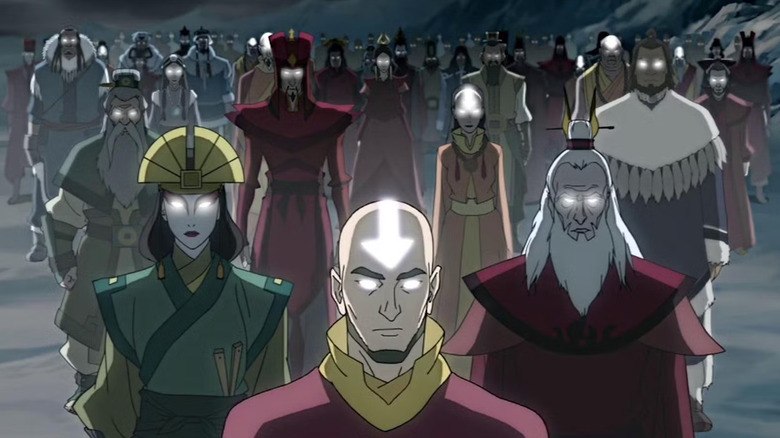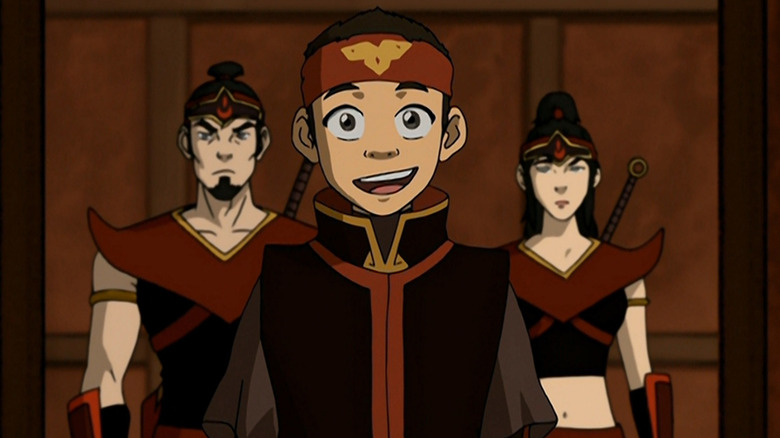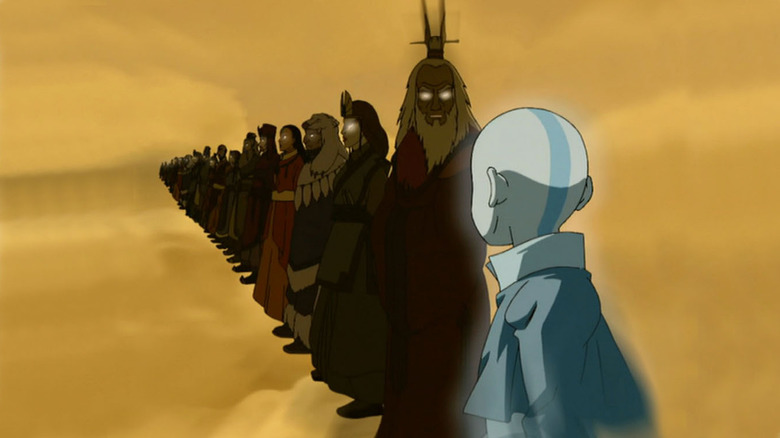Every Major Change In The New Avatar: The Last Airbender Series
After years of morsels and rumors, delays on the upcoming animated "Aang: The Last Airbender" feature film, and well-kept secrets on behalf of Avatar Studios, we finally know, in official terms, what the next animated series in the franchise will be about. The show is now called "Avatar: Seven Havens," and it looks to mark a major departure from its predecessors, "Avatar: The Last Airbender" and "The Legend of Korra," in several ways.
The official synopsis relayed by Nickelodeon describes the show as being "set in a world shattered by a devastating cataclysm. A young Earthbender discovers she's the new Avatar after Korra — but in this dangerous era, that title marks her as humanity's destroyer, not its savior. Hunted by both human and spirit enemies, she and her long-lost twin must uncover their mysterious origins and save the Seven Havens before civilization's last strongholds collapse."
There's a lot to unpack there, both in terms of the big mysteries, the changes to the "Avatar" universe, and what it all means for the franchise's overarching timeline. Many theories have flown around in the fandom about what the next show set after "The Legend of Korra" could be about, with some even holding out hope (or fear, depending on your tastes) for a cyberpunk-inspired series that evolves the tech seen in that prior show. Naturally, a series along those lines would have also paid direct homage to a certain era of retro anime that's long inspired co-creators Bryan Konietzko and Michael Dante DiMartino's approach to the Avatarverse. However, this new, confirmed synopsis signals that "Seven Havens" will take things in a distinctly different direction.
Avatar: Seven Havens will be exactly two seasons long
The first interesting aspect of "Avatar: Seven Havens" is that it has a specific length confirmed from the start. The show will span 26 episodes split into two seasons or "books," as they're known in the "Avatar" universe. Each season will consist of 13 episodes — the same number averaged across the four seasons of "The Legend of Korra."
It's great to see Nickelodeon giving "Seven Havens" a multi-season commitment right out the gate, especially considering how "The Legend of Korra" was hampered through its production by season-to-season renewals. (Notably, when Season 3 and Season 4 were commissioned together, this allowed for much more interconnected storytelling between them.) It's also interesting to note that "Seven Havens" is sticking with the shorter seasons of "Korra" rather than the longer seasons of "The Last Airbender," which were 20 or 21 episodes each.
Could "Seven Havens" end up running longer than its announced 26 episodes? Anything is possible. It's worth recalling that "The Legend of Korra" was essentially a miniseries in its first season; it was only after more episodes were ordered that it began to really expand its scope. From the sound of things, Konietzko, DiMartino, and the rest of the "Seven Havens" creative team (which includes prolific "The Last Airbender" director Ethan Spaulding) have a pretty tight vision for this new show, so 26 episodes may be all we get.
Either way, "Seven Havens" will presumably air on Nickelodeon proper, though a synchronous Paramount+ release schedule seems likely given the franchise's significant young adult fandom. "The Legend of Korra" threaded the needle between a kids cartoon and an adult anime, frequently hewing closer to the latter camp. As a result, it was constantly moved around by Nick, with many episodes of "The Legend of Korra" airing online instead of on television, much to the confusion of audiences. That hopefully won't be a problem this time around, what with streaming having made things a bit easier on shows with gray-area target age ranges.
Avatar: Seven Havens sounds like an apocalypse show
Enough about the form factor of "Avatar: Seven Havens" — let's talk more about that synopsis. While we don't yet know what the "devastating cataclysm" is, it sounds bad. Real bad, if there are only seven human havens remaining in the world, and it sounds like even those are in serious danger. The synopsis also claims that the main character's status as the Avatar "marks her as humanity's destroyer, not its savior." That suggests that whatever the cataclysm is, it's tied to the Avatar, which means it's tied to the Spirit World. So, let's get to theorizing.
By the end of "The Legend of Korra," the "Avatar" universe is in the midst of a major technological revolution. There are robots, high-speed rail systems, and numerous other advancements that straddle the line between modern and futuristic. However, many of the most fantastical devices seen on the show are powered by spiritual energy and use energy sources like the vines of the Spirit Wilds for fuel.
The "Avatar" franchise has always been interested in the conflict between industrialization and natural spirituality. You can trace that focus back to "Princess Mononoke," which was one of the biggest individual inspirations for "The Last Airbender." To that end, it seems feasible that there was some sort of spiritual apocalypse in the lead-up to "Seven Havens" — a collapse of all spiritual-powered technology, maybe, or, if that kind of tech ends up being banned after the events of "The Legend of Korra" (which would make sense), another kind of dark spiritual corruption?
Given that "Seven Havens" will take place in the wake of this cataclysm, it's also possible that the Avatar's reincarnation could have been the initiating force. That would explain why the Avatar is now seen as a destroyer.
How does the idea of twin Avatars even work?
The official synopsis for "Avatar: Seven Havens" doesn't confirm that both twins are the Avatar. It says that one of them discovers she is the Avatar and then reconnects with her long-lost twin, seeking answers about their "mysterious origins." That could mean two characters existing at the same time with Avatar powers. It could also mean those powers have somehow been split between the two of them. Or perhaps it means some other strange circumstance I can't think of. Whatever the case, the unique situation begs questions. The Avatar is reincarnated upon the death of the last vessel and the birth of the next. So, what happens when it's twins?
We've actually gotten a glimpse of that already in the canonical 2024 novel "The Reckoning of Roku," in which it's revealed that Avatar Roku had a twin who died when they were children. Since the Avatar is typically identified later in life, it's hard to say whether or not Roku's twin, Yasu, had any connection to Raava the light spirit, or the larger Avatar lineage. The new show will presumably dive into those questions in more detail.
There's also the time gap between "Seven Havens" and "The Legend of Korra" to consider. The last Avatar we met was only about 21 at the end of her show, so she could have lived for many decades before passing on. That could mean "Seven Havens" Book 1 will take place as much as 100 years after "The Legend of Korra" Book 4. In that time, more technology would have surely been developed in the "Avatar" universe, all while the portals Korra previously opened between the physical and spiritual realms may have drastically changed the ecology and societal structure of the world.
In other words, even if "Seven Havens" is a post-apocalypse show, the world that was destroyed could still be a wildly different one than the one that had come to exist by the end of "The Legend of Korra." Regardless, it sounds grim and pregnant with potential. While Netflix's live-action "Avatar: The Last Airbender" TV show adaptation is fine, it lacks the thematic bite of the previous animated "Avatar" series. Konietzko and DiMartino seem determined to make something different this time around, and "Avatar: Seven Havens" could be all the better for it.
"Avatar: Seven Havens" has yet to set a premiere date. Meanwhile, "Aang: The Last Airbender" will reach theaters on January 30, 2026.



